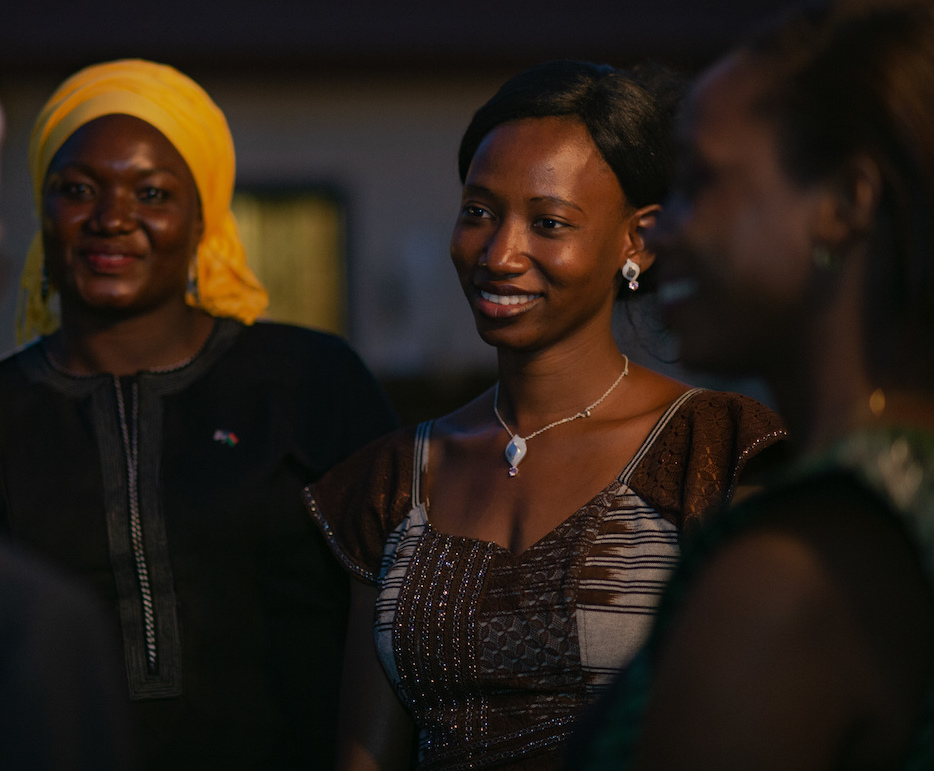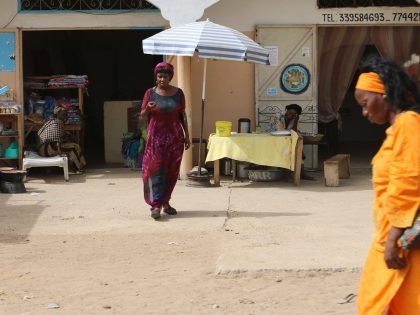Feminists organizing offline in Africa
On the African Women’s Development and Communication Network (FEMNET) based in Kenya.

Image credit Evan Parker for US Navy photo.
- Interview by
- Rama Salla Dieng
Mwanahamisi Singano is the Head of Programs at FEMNET, a leading membership-based pan-African feminist organization in Kenya. In this interview, she explains the need for both conventional and non-conventional advocacy, communication and capacity-building strategies to address the range of challenges faced by women and girls in Africa.
Thanks for accepting to be part of this interview series. I am grateful to have met you last year during a regional gender consultation in Dakar, Senegal. Can you please introduce yourself and your organization, FEMNET?
I love to introduce myself as an African carrying a Tanzanian passport because I pledge allegiance to the ideals of pan-Africanism. I am a feminist—an African feminist to be precise. For me and my African feminist sisters, our battles are twofold in the sense that we have to dismantle patriarchy and fight neoliberalism. Currently, I work at FEMNET as head of programs. Established 32 years ago, FEMNET works to inform, engage, mobilize and convene African women and girls in all their diversity in the quest to attain gender equality and transformative changes in our societies.
How is FEMNET organized in terms of decision-making, accountability and leadership structures?
FEMNET is a membership organization—with over 800 members in 43 African countries. The secretariat in Nairobi does work on behalf of its members across Africa. FEMNET is led by a board of directors elected from all five sub-regions in Africa.
Can you tell us more about FEMNET’s advocacy campaigns and activities?
FEMNET delivers its works through three main strategies: capacity building, advocacy and communication. For African women and girls to effectively and efficiently influence change in their communities and in the policy processes and space, they need to have enough knowledge and skills on how the processes work, how change happens and what policies and procedures govern the changes they want to see. FEMNET and her members engage in both conventional and non-conventional advocacy activities to demand gender equality. Meanwhile communication glues everything together.
As feminist organization, we know how engrained patriarchy is. As an oppressive ideology, it shapes our perception of the self, nurtures unequal societies and builds institutions to serve men. Hence, we believe, we cannot separate the policy processes and institutional practices from collective or individual behaviors and beliefs.
With that in mind, FEMNET develops advocacy agendas, runs public campaigns to address specific issues, influence decisions in specific policy spaces, or demand change from targeted segments of the general public. A perfect example is the #DignifiedResponse campaign developed to ensure that the COVID-19 response and recovery plans uphold the dignity of every African especially marginalized communities, women and girls.
If I understand well FEMNET are organizing both online and offline? I wonder how challenging it is and how you engage your community about your vision, activities and political positioning?
FEMNET members do most of their national offline organizing with the secretariat, echoing that work with robust strategies to attain strategic communication for change within FEMNET membership and outside FEMNET membership.
FEMNET however mobilizes, organizes and convenes African women and girls—in their diversities to directly engage with regional institutions like the African Union (AU), Pan-Africa Parliament (PAP), African Commission on Human and Peoples’ Rights (ACHPR), The African Governance Architecture (AGA) just to mention a few. At the global level, FEMNET and members engage with the UN Commission on the Status of Women (CSW), the High Level Political Forum (HLPF), the UN General Assembly (UNGA) and the list goes on.
The diverse nature of African realities, histories and culture pose a unique challenge in organizing and coordinating African women and girls to speak with one voice especially in global platforms/processes, hence the emergence of several camps when it comes to issues which have been labeled “controversial” or “divisive.”
To address the challenge, FEMNET invests in building the capacity of all her members especially in understanding and embracing African feminist principles, which demands solidarity for and with African women in their diversities.
You have recently launched The Pan-African Women, Girls & Activists COVID-19 Response Plan. Can you tell us more about this?
The Pan-African Online Hub by African women and girls is a one-stop platform containing critical information resources about COVID-19 in Africa from a gender and feminist perspective. African women and girls in all their diversities can access practical information on COVID-19 and most importantly use the platform to share their COVID-19 lived experiences and realities. The Online Hub includes key recommendations, opinions and analysis by Africans available for use by advocates, activists and feminists to influence and lobby for dignified and inclusive COVID-19 responses in different African countries.
The Online Hub is managed by FEMNET on behalf of our diverse members and partners—and we continue to call for all national, regional and global COVID-19 response strategies and measures to be inclusive and dignified, so that the most vulnerable populations in our communities are identified, respected and reached first.
Can you please tell us more about ‘I Am Here’ Stories & Realities of African Women And Girls Tackling The COVID-19 Pandemic?
Since the pandemic, we have witnessed a one-sided channel of communication, from the government/authorities to the people. People’s realities, stories and experiences during the COVID-19 pandemic have been either ignored or sidelined—to say the least. The “I am here” section of the online hub, therefore, is designed to create a space in which individuals can share their stories of struggles, triumph and everything in between. It is a space for African women and girls to speak in their authentic voices with no apology, fear or stigma. To us as an organization, every story has a potential to influence either policy, practice, behavior and/or beliefs—we know the personal and political, hence every life, every experience and every story is unique and it matters.
You have written extensively about the devastating gendered outcomes of the pandemic, especially on violence against women, and the decision on the Commission on the Status of Women (CSW); what does a post-COVID-19 future look like?
COVID-19 did not create the crisis, it exposed it. The world before COVID-19 was a brutal world, organized to feed and fuel endless greed of a few, creating mass exploitation, oppression and extreme extraction of nature and people, especially women. COVID-19 exposed the evils of our societies, institutions and nations. On the positive side, it created a moment to test what activists and feminists have been fighting for all along; an equal, just, fair and sustainable world. Thanks to COVID-19 we now know the ideals we were and still fighting for are not utopia. We have seen some governments, groups, and individuals working hard to ensure everyone has the basic needs they need to stay home and stay safe.
As a person, I wish there was a pre-COVID-19 world and a post- COVID-19 world. I do not wish for the world to go back to “normal” but rather embrace the strongest lessons COVID-19 brought in our faces—ubuntu (I am because you are). Post COVID-19 societies should be built on the values of shared humanity, respecting and promoting human rights while upholding the highest values of dignity and decency.
The COVID19 future should be:
✔Fair
✔Equal
✔Just
✔Inclusive
✔Transformative
✔Sustainable
✔Feminist
I know that you have had a long experience in movement building and feminist activism in Africa. If you were to share three main lessons you have learnt on the changing landscape for feminist activists in East Africa, what would those be?
This might not be lessons but rather frustrations. I am hugely disturbed by political and ideological bankruptcy among activists or even those who identify themselves as feminists. Ideology glues and shapes movements—it dictates what needs to be done, when and how—it brings the personal in the politics. More importantly, ideology sets parameters of what is negotiable and non-negotiable, what can be done, and what CAN NEVER be done by feminist activists. What we are seeing now, the personal in the movement, is being treated as an empty vessel to showcase a white-washed men centered agenda while congregations in the name of movements are being institutionalized to become the properties and entities owned by a few who work every day to become “donor darlings” at the expense of others.
We have experienced the bitter truth, which is that COVID-19 respects no borders, names or brands. I solely wish, our movement learns that, our brands and identities matter less when it’s a matter of life and death—and often women’s right are a matter of life and death. So, can we politically unite to dismantle patriarchy and neoliberalism?
What acts of radical self-care do you practice?
I know this is the time to take care of my soul as much as my body. I spent most of my time revisiting the struggle of our forefathers and mothers. Since working from home started, I have been keen on listening to speeches and lectures of our revered leaders and feminists who blazed the trail before us. But by doing so, I am becoming less nervous about the uncertainties, after all they endured the worst. I am also informed and inspired to do more for my peace of mind, but also for my people, Africans.



